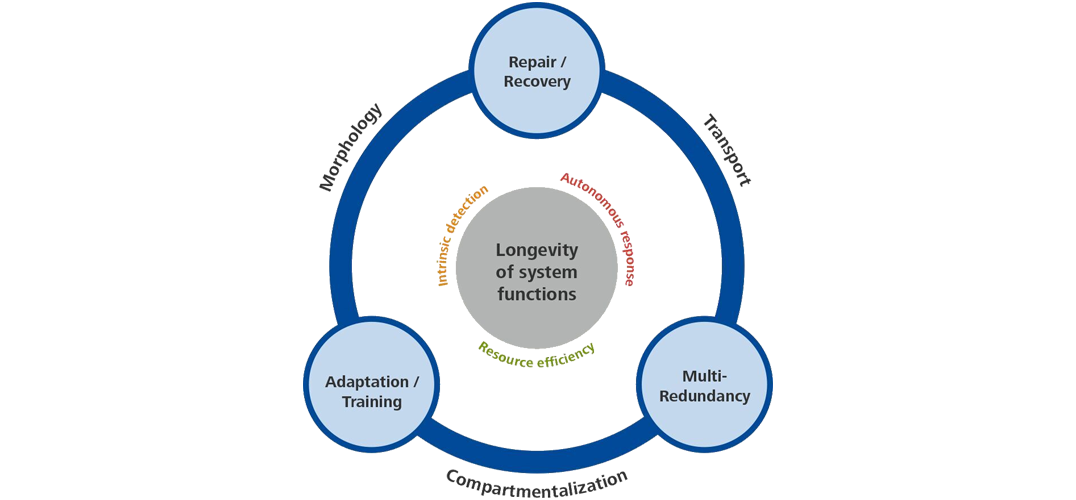Forschungsbereich C

Langlebigkeit
Der Forschungsschwerpunkt "Langlebigkeit" umfasst die langfristige strukturelle Integrität und Funktionalität von lebenden Organismen und technischen Systemen. Pflanzen eignen sich besonders als biologische Modelle für technische Anwendungen, da sie verschiedene Funktionsprinzipien zur Schadenskontrolle entwickelt haben. Schadensvermeidung umfasst die Ausbildung von graduellen Übergängen und die Fähigkeit, strukturell und mechanisch auf Umweltbelastungen zu reagieren und so höheren Lasten standzuhalten. Schadensmanagement reicht von Selbstversiegelung und anschließender Selbstheilung bis hin zur Schaffung von Bruchstellen, die eine kontrollierte Trennung von Werkstoffsystemen gewährleisten. Darüber hinaus kann die Fehlertoleranz eines Gesamtsystems durch die Ausbildung von redundanten Strukturen erhöht werden.
Koordinatoren Forschungsbereich C
Prof. Dr. Chris Eberl, Prof. Dr. Jürgen Rühe
Projekte in Forschungsbereich C
Langzeitprojekte 2022 und 2023
- AI²nterface – Advanced interfaces for modular livMats through AI assisted design and experimental realization of programmable materials interfaces
Kooperationsprojekt der Forschungsbereiche B und C. - MetaGen4Morphing– Implementation of a programmable meta materials toolbox for complex shape morphing in adaptive and long living materials systems by simulation, experiments and machine learning
- Generation of Materials with Adaptive Mechanical Properties – Stimulus-Induced Lignification and Softening
- A4S - Autonomous Actuators for Adaptive Architecture and Soft Robotics
- Resilient hierarchical microfluidic networks for fuel transport and information processing
- Encapsulated Chemistries in Rationally Designed Metamaterials for Advanced Multi-Functionalities on Demand
Kooperationsprojekt der Forschungsbereiche B und C. - The mistletoe-host interface as model for long-term integrity by damage prevention and repair
- SNAPVALVE - Soft snap-through electromechanical valves for autonomous soft machines
Kooperationsprojekt der Forschungsbereiche C und Demonstratoren. - METAINFLATE – Inflatable Metamaterials for Morphological Control
Kooperationsprojekt der Forschungsbereiche C und Demonstratoren. - Making materials long-lasting: shedding of damaged layers in a locally controlled way
Dieses Projekt ist Teil des Agnes-Pockels Doctoral Fellowship Program des Exzellenzclusters. - Synthesis of small molecules bearing two C,H-inserting moieties able to functionalize and crosslink polymers
- Bridge-Project EXC livMatS / EXC IntCDC – architectural integration of self-shaping mechanisms
Langzeitprojekte 2019 und 2020
- Abscission and self-repair in biological and artificial materials systems
- Training and self-healing by interface snapping mechanisms
- Self‐sealing by orchestrating chemical and mechanical mechanisms and processes as basis for self‐healing in livMatS
- Eingebettete (mikro)-fluidische Netzwerke in weichen Materialsystemen: Ein Weg zu adaptiven Prozessen, Selbstregulierung und Selbstreparatur
- Hierarchically Programmable Materials with Propagating Stimulus Responsive Elements and Metamaterial Ultrastructuring
Kooperationsprojekt der Forschungsbereiche B und C. - Training Materials like Muscles
Kooperationsprojekt der Forschungsbereiche B und C. - Mechanical metamaterials that can adapt and learn
Kooperationsprojekt der Forschungsbereiche B und C. - Electret-based fluttering for wind energy harvesting with internal structure
Kooperationsprojekt der Forschungsbereiche A und C. Dieses Projekt ist Teil des Hermann Staudinger Doctoral Fellowship Program des Exzellenzclusters. - Novel Materials for maskless lithography and 3D printing
Dieses Projekt ist Teil des Hermann Staudinger Doctoral Fellowship Program des Exzellenzclusters. - Development of an artificial Venus flytrap
In Kollaboration mit den Forschungsbereichen A, B und Demonstratoren.
Booster Projekte 2023 - abgeschlossen
- Plant-inspired humidity-driven bending actuator
Kooperationsprojekt der Forschungsbereiche B, C und Demonstratoren.
Responsible Investigator: Prof. Dr. Claas Müller
Principal Investigators: Dr. Olga Speck und Prof. Dr. Thomas Speck - 3D Printing of shape-morphing surfaces for mechanical metamaterial surfaces
Kooperationsprojekt der Forschungsbereiche B, C und Demonstratoren.
Principal Investigator: Prof. Dr. Bastian E. Rapp
Junior Research Group leader: Dr. Viacheslav Slesarenko - Maskless microstructuring of livMatS surfaces
Kooperationsprojekt der Forschungsbereiche B, C und Demonstratoren.
Principal Investigators: Prof. Dr. Jürgen Rühe und Prof. Dr. Bastian E. Rapp - Intra- and extracellular self-assembly of filamentous protein polymers
Kooperationsprojekt der Forschungsbereiche B, C und D.
Principal Investigator: Prof. Dr. Ralf Reski - Programmable Hydrogel Hopper: Mechanical Confinement Harnessing Slow Deformation
Kooperationsprojekt der Forschungsbereiche B und C.
Principal Investigators: Prof. Dr. Chris Eberl und Prof. Dr. Bastian E. Rapp - Modelling Abscission of Plant Organs as Inspiration for the Separation of Artificial Materials Systems
Kooperationsprojekt der Forschungsbereiche C und D.
Principal investigator: Dr. Olga Speck
Responsible Investigator: Prof. Dr. Patrick Dondl - Thin-walled structures for soft machines via a new soap-bubbleinspired manufacturing technique
Kooperationsprojekt der Forschungsbereiche B, C und Demonstratoren.
Principal Investigator: Prof. Dr. Chris Eberl
Booster Projekte 2021 - abgeschlossen
- “Trained plants”: Responses of plant leaves of Pilea peperomioides to various mechanical stimuli
Principal investigator: Dr. Olga Speck - A Soft Biomimetic Actuator Inspired by the Self-Sealing Motion of Succulent Plants
Kooperationsprojekt der Forschungsbereiche C und Demonstratoren.
Principal investigators: Prof. Dr. Thomas Speck und Dr. Olga Speck
Responsible Investigator: Prof. Dr. Claas Müller - Reliability of mechanical metamaterials
Principal investigators: Prof. Dr. Lars Pastewka, Dr. Viacheslav Slesarenko und Prof. Dr. Chris Eberl - Heterogeneity as an ally against defects
Principal investigator: Dr. Viacheslav Slesarenko - (Self-)adaptive energy-autonomous materials systems for building hulls inspired by hygroscopically actuated plant structures
Kooperationsprojekt der Forschungsbereiche B und C.
Principal Investigators: Prof. Dr. Thomas Speck und Prof. Dr. Jürgen Rühe - Novel Materials Systems for Applications in Biomimetic Architecture and Building Construction
Kooperationsprojekt der Forschungsbereiche B, C und Demonstratoren.
Principal Investigators: Prof. Dr. Thomas Speck und Prof. Dr. Jürgen Rühe
Kurzprojekte 2021 - abgeschlossen
- Fatigue in energy-harvesting mechanical metamaterials
Kooperationsprojekt der Forschungsbereiche A und C.
Junior Research Group leader: Dr. Viacheslav Slesarenko
Kurzprojekte 2020 - abgeschlossen